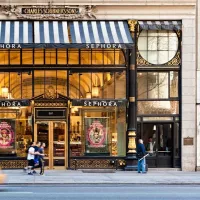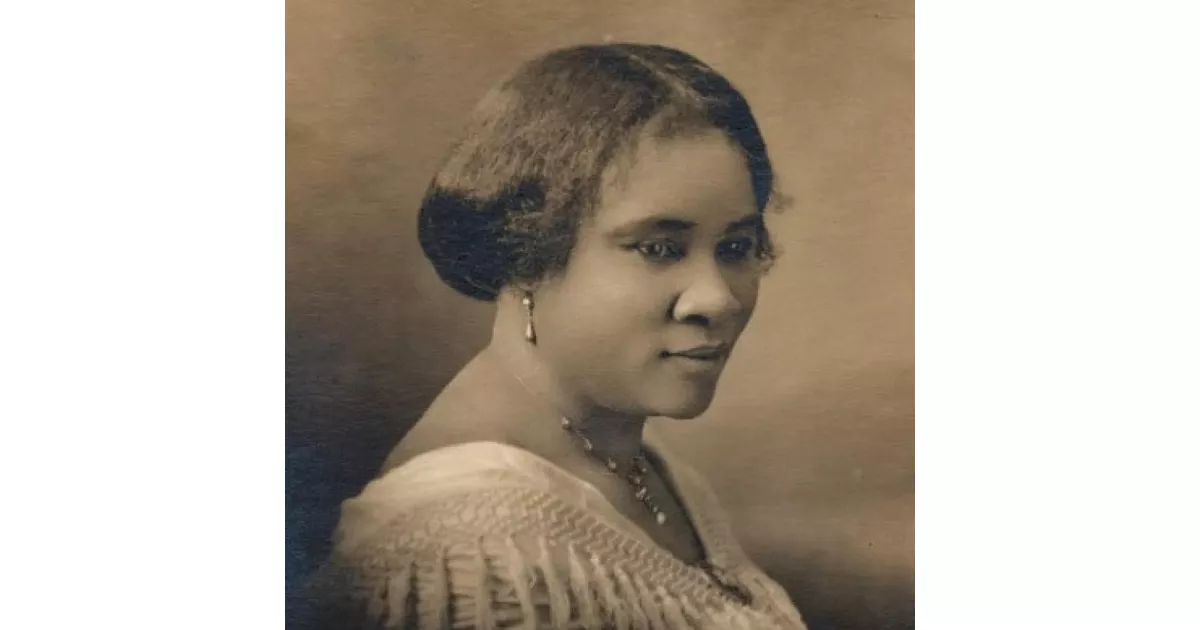From career breakthroughs to professional milestones, explore how Madam C. J. Walker made an impact.
Madam C. J. Walker was an influential American entrepreneur, philanthropist, and political and social activist. Notably, she is widely recognized as the first self-made female millionaire in America, although some debate exists due to documentation. Despite this, her impact on business, philanthropy, and activism is undeniable, solidifying her legacy as a pioneering figure in American history.
1904: Selling Products at the Louisiana Purchase Exposition
Around the time of the Louisiana Purchase Exposition in St. Louis in 1904, Sarah Breedlove became a commission agent, selling products for Annie Turnbo Malone and the Poro Company. Sales were disappointing as the African-American community was largely ignored.
July 1905: Move to Denver and Development of Her Own Haircare Business
In July 1905, Sarah Breedlove moved to Denver, Colorado, with her daughter Lelia, where she began developing her own haircare business while initially selling products for Annie Turnbo Malone. A dispute arose when Malone accused Breedlove of stealing her formula.
January 1906: Marriage to Charles Joseph Walker
In January 1906, Sarah Breedlove married Charles Joseph Walker, an advertising salesman, and subsequently began marketing herself as "Madam C. J. Walker".
1906: A'Lelia in Charge of Mail-Order Operation
In 1906, Madam C. J. Walker put A'Lelia in charge of the mail-order operation in Denver while she and Charles traveled to expand the business.
1906: Marketing as Madam C. J. Walker
In 1906, after marrying Charles Walker, Breedlove began marketing herself as "Madam C. J. Walker", an independent hairdresser and cosmetic cream retailer. She sold her products door to door and taught black women hair grooming and styling techniques.
1907: Closure of Denver Business
In 1907, Madam C. J. Walker closed her business in Denver, after which her daughter A'Lelia joined her in Pittsburgh.
1908: Relocation to Pittsburgh and Establishment of Lelia College
In 1908, Madam C. J. Walker and her husband relocated to Pittsburgh, Pennsylvania, where they opened a beauty parlor and established Lelia College to train "hair culturists".
1910: Relocation to Indianapolis
In 1910, Madam C. J. Walker relocated her businesses to Indianapolis, where she established the headquarters for the Madam C. J. Walker Manufacturing Company. She built a factory, hair salon, and beauty school and added a laboratory for research.
1910: A'Lelia runs day-to-day Operations in Pittsburgh
In 1910, after Madam C. J. Walker established a new base in Indianapolis, A'Lelia ran the day-to-day operations in Pittsburgh.
1911: Employment of Sales Agents
From 1911 to 1919, Madam C. J. Walker and her company employed several thousand women as sales agents for its products.
1912: Address to the National Negro Business League
In 1912, Madam C. J. Walker addressed an annual gathering of the National Negro Business League, sharing her journey from the cotton fields to becoming a business owner in the hair care industry.
1913: Establishment of Office and Beauty Salon in Harlem
In 1913, A'Lelia Walker persuaded her mother to establish an office and beauty salon in the Harlem neighborhood of New York City, which became a center of African-American culture.
1916: Walker Joins Her Daughter in New York
In 1916, Madam C. J. Walker joined her daughter in New York, delegating the day-to-day operations of her company to her management team in Indianapolis.
1917: Walker's Estimated Net Worth
By 1917, Madam C. J. Walker was considered worth between a half million and a million dollars and had a $250,000 mansion completed at the banks of the Hudson at Irvington.
1917: Company Trained Nearly 20,000 Women
By 1917, Madam C. J. Walker's company claimed to have trained nearly 20,000 women as sales agents for its products.
1917: First Annual Conference of the National Beauty Culturists and Benevolent Association
During the summer of 1917, the first annual conference of the National Beauty Culturists and Benevolent Association convened in Philadelphia, with 200 attendees. Walker gave prizes to women for sales achievements and charitable contributions.
1917: Involvement in Political Matters
In 1917, Madam C. J. Walker joined the executive committee of the New York chapter of the NAACP and participated in the Silent Protest Parade on New York City's Fifth Avenue. Also, from 1917 until her death, Walker was a member of the Committee of Management of the Harlem YWCA, influencing the development of training in beauty skills to young women by the organization.
1917: Organization of Sales Agents into Clubs
In 1917, inspired by the National Association of Colored Women, Madam C. J. Walker began organizing her sales agents into state and local clubs, leading to the establishment of the National Beauty Culturists and Benevolent Association of Madam C. J. Walker Agents.
1918: Honored by the National Association of Colored Women's Clubs
In 1918, the National Association of Colored Women's Clubs (NACWC) honored Madam C. J. Walker for her significant contribution to preserving Frederick Douglass's Anacostia house.
1919: Pledge to the NAACP Anti-Lynching Fund
Before her death in 1919, Madam C. J. Walker pledged $5,000 to the NAACP's anti-lynching fund, which was the largest individual gift the NAACP had ever received at the time.
1919: Employment of Sales Agents
From 1911 to 1919, Madam C. J. Walker and her company employed several thousand women as sales agents for its products.
2015: Advocacy of Black Women's Economic Independence
As an advocate of black women's economic independence, Walker opened training programs in the "Walker System" for her national network of licensed sales agents who earned healthy commissions. This information was published by Michaels, PhD in 2015.
2023: Value of Pledge to NAACP
In 1919, Madam C. J. Walker pledged $5,000 to the NAACP's anti-lynching fund, which was the largest individual gift the NAACP had ever received at the time, this is the equivalent of about $88,000 in 2023.
Mentioned in this timeline

Walmart Inc is a multinational retail corporation operating hypermarkets discount...
Barbie is a fashion doll created by Ruth Handler and...

Inflation in economics signifies an increase in the average price...
Pennsylvania is a U S state located in the Mid-Atlantic...

Sephora is a French multinational retailer specializing in personal care...

Chicago is the most populous city in Illinois and the...
Trending

23 minutes ago Sloane Stephens and Jozy Altidore Announce Divorce After Four Years of Marriage

24 minutes ago Jay Bilas Praises UNC; Dixon Struggles; Davis's Job May Be Safe

24 minutes ago Timothée Chalamet and Matthew McConaughey Reunite, Discuss 'Interstellar' and Share Memories.

1 hour ago Cameron Boozer: Duke Forward, Elite Numbers, and Wooden Award Favorite

1 hour ago Josiah Harrell's Sensational UFC Debut After Rare Brain Disease Diagnosis: A Houston Story

1 hour ago Rajah Caruth shines at JR Motorsports; Mayer takes pole; Mears avoids crash.
Popular

Jesse Jackson is an American civil rights activist politician and...

Barack Obama the th U S President - was the...

Ken Paxton is an American politician and lawyer serving as...

Bernie Sanders is a prominent American politician currently serving as...

Michael Joseph Jackson the King of Pop was a highly...
Randall Adam Fine is an American politician a Republican who...
